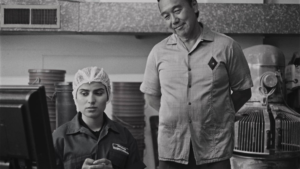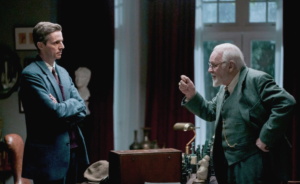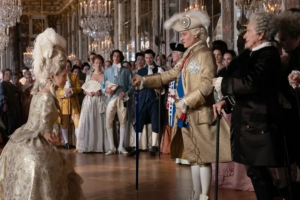by GREG KING
Fresh is a powerful and stark new film which presents a grim picture of inner city New York in the 90s, a society full of despair and gripped by the inescapable nightmare of street crime, drugs and casual violence. The film has been produced by none other than Lawrence Bender, best known for his collaborations with Quentin Tarantino on those chic and gibberingly realistic ultra violent slices of life on the wild side such as Reservoir Dogs and Pulp Fiction. The film also marks the directorial debut of Boaz Yakin, a New York born and bred writer who has paid his dues through five years spent in Hollywood churning out high energy but low brow action drivel such as The Punisher with Dolph Lundgren, and The Rookie with Clint Eastwood.
The shocking and controversial film centres around Fresh (played by sensational newcomer Sean Nelson), a 12-year old kid who has lost his innocence a long time ago. While his other school age friends pursue more mundane activities, Fresh runs drugs for two local drug dealers both before and after school. Fresh is witness to shocking and depraved acts of violence in an often callous and amoral world, and the film explores how he attempts to reclaim control of his own life and break out of this destructive and vicious cycle of drugs, easy money and senseless violence. His strategy for survival only becomes clear through the illicit meetings with his estranged father (Samuel L Jackson), whom he meets in Washington Park for chess games which also become lessons in life.
To find out a little more about this compelling and brutally honest drama which has galvanised audiences around the world with its sense of urgency, its unforgettable themes and its rather grim view of a contemporary, blighted American urban landscape scarred by violence, obsessed with guns, tainted with the spectre of drugs and governed with fear, GREG KING spoke to Yakin.
Yakin admits that he is influenced by directors such as Kurosawa and Hitchcock, and especially by American films of the late 60s and early 70s, when American directors began to embrace the cinematic tricks of the avant garde European directors, while still maintaining their vivid American identity and energy. He cites films such as Straw Dogs, Mean Streets, The Conversation and Midnight Cowboy as amongst his favourites, and the palpable sense of gritty urgency and powerful undercurrents of urban violence which power those dramas is very much in evidence in Fresh. In fact, Adam Holender, the cinematographer who imbued New York with its gritty look and sleazy perspective for the Oscar-winning Midnight Cowboy, also does the honours with Fresh, a coup which both excites and pleases Yakin.
How did the idea for Fresh come about?
At the time I had lived in Los Angeles for five years and I was writing a lot of screenplays for action films and things that had very heroic and very invulnerable characters. For me, drama should be far more interesting, with a feel for the characters and everything. I really wanted to tell a story about someone that I felt would be the weakest character possible and force them to deal with a situation all by themselves and sort of see how they could deal with that. And obviously the weakest person in society is a child, a kid, and that’s sort of where the idea started to take shape.
Would you prefer to describe Fresh as a product of his environment or a victim of circumstances?
A product of his environment is better in that we’re all victims of circumstances. And one of the things about this character is that he’s not a victim and he doesn’t allow himself to be one. And despite the fact that, at the end of the day he sort of loses by winning so to speak, he doesn’t come out of it smelling like roses, he’s certainly not a victim. And in his own laid back way he’s a pretty aggressive character. But definitely a product of his environment. And the sort of terrible things he does, I really wanted to portray and show that. In the first part of the film you can see him absorbing so much violence that when he can’t stand it anymore – although he doesn’t show it on his face – what he returns to that environment is what he’s been getting, which is a lot of destruction, basically.
That environment is a pretty grim and horrific one, judging by the picture you paint of life in New York, with young children involved in drugs and violent street crime?
The film isn’t so much amoral as it’s presenting a world that’s amoral. The fact is that eight, nine and ten year old kids are running drugs and are involved in violence and are carrying weapons. And, you know, it’s not the only aspect of life in the inner city or in America, but it’s enough of a problem to certainly be worth being very nervous about.
The fact is, two days after Fresh was released, an eleven year old kid shot someone in a playground, and the next day he himself was shot by a couple of fifteen year olds who didn’t want him to talk about it.
There’s a lot of anger contained in the film. Did you write from a personal experience?
No, not on a personal level. I mean, when you’re in New York you experience that atmosphere, and all that. I grew up in Manhattan. I didn’t grow up in the Bronx or Brooklyn, so what the kid in Fresh experiences was pretty far from the life I had. That’s something that’s going on, something that’s a pretty tragic part of American society these days, and I just thought it was a strong area to work in.
Did you deliberately set out to shock people with your depiction of the reality of life in contemporary urban America?
Well, I don’t know that I thought of it from that point of view. I think what I really wanted to do with the film was to take a character that would be very hard to escape and lock you into his point of view for two hours, and either you stick with it or you don’t. But I really wanted to present the world through, not necessarily the eyes but the sphere of experience of this one kid. And if that feels like a slap in the face… Someone who lives there doesn’t feel like it’s a slap in the face because that’s what they see every day. The sort of relentlessness in the film is jarring.
I mean, I did a screen writing workshop in a high school in the South Bronx for a while when I was researching the film. To get in you had to pass through a metal detector. Some schools have these airport detector things, but this one was like you had to raise your hands and this guy had one of those machines that they hold in their hands and frisk you up and down with it beeping at you, and you had to take out your keys and everything. It was like passing through El Al customs! Imagine bringing your books to school and getting checked for heavy weapons. I mean, society should not function that way, but that’s what’s going on!
You are primarily a writer. Why did you feel that Fresh was so important that you had to direct it yourself?
I didn’t quite work that way. Even when I started writing screenplays I was writing them in order to get to the point where I would direct them. All along I had been writing screenplays in order to get to the position where I could direct them, but I was not in a position for anyone to give me money to direct a movie. So it was not that all of a sudden I decided to direct this one. Had anyone allowed me to direct the others I would have.
Was it a fairly daunting prospect to direct your first movie?
Yes, but fortunately one of the main producers, Lawrence Bender, had just produced a movie and was very helpful in getting me up on my feet, getting me comfortable with it. But no matter what you do it’s a very difficult job, and it’s really hard. It’s not much fun directing a movie, it’s a hell of a lot more fun writing. You’re in your room, you stare out the window, it’s a more solitary and free kind of a thing. Whereas when you’re directing you’re dealing with a million things all the time, and I certainly can’t recommend it.
Would you do it again if the right project came along?
Yeah, I mean, I’m trying to do it again. But you have to sort of steel yourself and say: ‘OK, this is a story I really want to tell. My next two years are going to suck, so this had better be worth it.’ And when I feel I have a story that means that much I feel I would be ready to direct it.
You’re currently in Jerusalem. Are you working on another film?
I don’t know if it’s a film, but it’s a script. I’m working on a script that deals with the experiences, a kind of fictionalised account of the experiences of my family during the years between like 1945 and 1948, here during the War of Independence and so on.
How did you and Lawrence Bender get together for the film?
We’ve been friends for years and years, and I used to buy him lunch when he was starving. After five years of working in Hollywood I got really tired of it and went off and lived in Paris. While I was away Lawrence produced Reservoir Dogs, and suddenly was in a position to get money for a film with a reasonable budget. When I got back from Paris Lawrence suggested to me that if I wrote something that we could make for a reasonable budget he could get money for it.
Does he buy you lunch now that he’s a famous producer?
No he still doesn’t… that’s because he’s a cheap bastard, not because he can’t afford it. [laughs] I’m kidding.
Finding the right actor with the maturity and strength to make the character of Fresh credible was obviously important. It must have been fairly difficult to cast the movie?
It was difficult. But then we found Sean and it stopped being difficult. As soon as we found him everything fell into place. He really made the movie work and he was so wonderful. This is the first big thing he’s ever done. He did a few little theatre things, he did one guest spot on a sitcom, and then, boom! He had to carry a two hour movie, and he’s in every scene. And he did it beautifully. Everyday he was there, he did his job, he hated to leave. And he was just a real professional. He just got a great part right now – he’s playing opposite Dustin Hoffman in American Buffalo.
Sam had read the script. He had gotten it on his own somehow and he read it even before we were casting, and he told Lawrence that he wanted the part. So we didn’t even go looking once Sam said that that’s what he wanted to do. So I met Sam and it was pretty clear that he was going to be the best person for the part. This was like before he got super busy! He’s great. He had like only a week on the shoot but he was very professional, very skilled, and he worked with Sean very, very well. He also listens, which is very important, and he tries to help you do what you’re trying to do. And it was a very pleasant experience.
A lot of what you’re trying to do as a director comes in the casting anyway. And when you get people who are so right, like Sam, and know what they’re doing it’s really only a few steps to get it to where you really need to be.
The chess in the movie acts as a metaphor for life. It also makes Fresh’s strategy for survival clear. How did you conceive of those scenes as a method of exploring these concepts?
Yeah, that’s what it was conceive for as you say, and that’s what it’s there for. Film is a very extroverted medium, you don’t really show what’s going on in somebody’s mind, and this was a pretty silent character and I needed to find a way to make people understand how smart he was, how he could think in a certain way that would make the whole plot machination believable. I really used the chess to show externally the methodical way his mind worked.
Has the response to Fresh surprised you?
It’s doing ok. Critically, it’s been beyond my expectations. It’s not so much a surprise, you’re always a little nervous, and when it comes out good you’re happy and relieved. I really have been very pleased by it, In have to say. I have no complaint.





